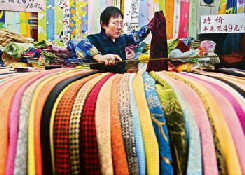US textile decree to cloud trade relations
( 2003-11-20 00:06) (China Daily)
The US decision to re-impose quotas on three types of textile products from China, which has disappointed all levels of local industry, will hurt related businesses and consumers in both countries and dampen economic and trade relations between the two sides, analysts say.

A woman measures cloth at a shop in Shanghai November 19, 2003. Chinese textile firms expressed anger Wednesday over US plans to slap import quotas on a range of China-made products, saying they would fight the move. [Reuters] |
On Tuesday in Washington, US Commerce Secretary Don Evans announced the US Committee for the Implementation of Textile Agreements (CITA) had decided to set quotas on Chinese imports of knit fabric, dressing gowns and bras, which he claimed "demonstrates the Bush administration's commitment to our trade rules and America's workers.''
Details of the imposed quotas will be decided after negotiations between both sides.
The quotas were first eliminated when China joined the World Trade Organization (WTO) at the end of 2001.
Analysts have condemned the decision to re-introduce them, saying it will increase prices in the United States, and damage Sino-US trade relations and the liberalization of world trade.
The Chinese Ministry of Commerce has shown deep regret and firm opposition over the move.
The ministry's spokesman, Chong Quan, said China will reserve the right to protect its interests through the WTO.
Chong said both the Chinese Government and textile industry have pointed out many times that the US textile industry -- in its application for quota restrictions -- had failed to prove that a reduction in the demand of its products at home was being caused by Chinese imports.
Tuesday's decision did not conform to CITA's procedure on special safeguards against Chinese textiles and apparel, and the pledges contained in the working group's report on China's accession to the WTO, Chong said.
"China hopes the United States will fully recognize the negative impact the decision will have on textile trade between the two countries, and on bilateral trade and economic relations as a whole,'' Chong said.
"China had hoped the United States would avoid abusing the special safeguard measures.''
Zhang Hanlin, president of the China Institute for WTO Studies, reiterated that the decision will hamper economic and trade links.
"It is not a matter of the goods involved, but the sentiment of the decision,'' Zhang said.
China has pushed continually to maintain balanced trade with the United States and vowed to expand its imports from the United States.
A purchasing delegation was sent to the United States last week, signing US$6 billion worth of contracts for products that included planes and cars.
According to Zhang, the United States has ignored China's sincere efforts and turned an economic issue into a political matter.
Next year's presidential elections in the United States appear to be the main motivation behind Tuesday's announcement, Zhang said.
In the wake of the decision, the US dollar has struggled at record lows against the euro and near three-year troughs versus the yen as the market worries it could signal further shifts in the United States toward additional protectionist policies.
Analysts say they believe that substantial tariff hikes on foreign goods -- led by rising protectionism -- will probably blunt consumer spending in the United States, chilling foreign demand for some US assets as the world's biggest economy slows.
Another case illustrating the US' move toward protectionism is the WTO Appellate Body's ruling last Monday that its steel safeguards were inconsistent with WTO rules.
China's industries then urged the Chinese Government to do something to hit back at the move.
Co-operative spirit hurt by quota decision
Cao Xinyu, vice-chairman of the China Chamber of Commerce for the Import and Export of Textiles, said the re-imposed quotas will put the breaks on the good spirit presently being enjoyed between the Chinese and US textile sectors.
"I have met many delegations from some US retailers' associations and states who have been wanting to find local manufacturers in China, but the US move makes co-operation difficult,'' Cao said.
Cao said the textile industry is vital to China, like farming is to the Unites States, which he said employed more than 15 million people directly and over 100 million indirectly.
China is also one of the few countries in the world buying an increasing amount of textiles from the United States.
Imports of US fabrics and raw textile materials and products had risen 148 per cent on the year from January to September to US$787 million.
A spokesman from Qingdao-based Nannan Co Ltd, a wholly South Korean-owned manufacturer and China's largest exporter of bras to the US in 2002, said in light of this week's decision, its new investment plan will have to be terminated and newly recruited employees laid off.
Under the quotas, related fabrics and accessories suppliers, including those from US, will suffer grave losses, he added.
Bras, one of the products moving back under a quota system, are mainly exported to the United States after being made in China with materials supplied by the United States.
For example, one of the main suppliers of urethane elastic fiber -- a widely-used material for making bras -- is Dupont in the US.
Bra prices could rise under the US decision, one of its own trade groups has warned.
J. Craig Sherman, a spokesman for the US National Retail Federation, said: "We think this is going to raise costs for retailers and raise prices for American consumers by limiting the number of Chinese products that can be brought into the United States.''
|

